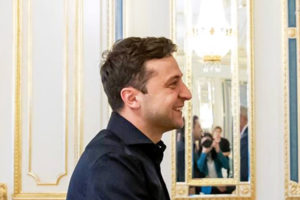Mission: Impossible? Ukraine’s New President Ventures To Reform Powerful State Spy Agency [Excerpt]

(Article text ©2019 RFE/RL, Inc., Radio Free Europe/Radio Liberty – rferl.org – Christopher Miller – KYIV, Aug. 17, 2019 – full article text appeared at rferl.org/a/ukraine-zelenskiy-reform-state-spy-agency-sbu-/30114589.html)
When Ukraine’s domestic security service revealed last year that it had faked the death of a dissident Russian journalist to expose a team of hit men allegedly hired by Moscow to destabilize the country by assassinating high-profile figures in Kyiv, it expected to take victory lap.
Instead, the stunt sparked widespread criticism and turned into a public-relations nightmare — one of many in the past 28 years that have tarnished the reputation of the Security Service of Ukraine.
A year later, fresh off huge election victories that brought him and his fledgling Servant of the People party to power, President Volodymyr Zelenskiy — a former comedian who has vowed to end endemic corruption and implement sweeping reforms – may have a chance to do what none of his predecessors was able to do: revamp the agency and restore its credibility.
How successful the 41-year-old Zelenskiy and his young team of reformers are in cleaning up the agency — arguably the country’s most powerful institution — will be a litmus test of his administration’s resolve to bring Ukraine more into line with Western democracies.
On the other hand, failure to reform the security service, critics say, could hobble wider efforts to curb corruption and economic crime, as the agency’s activities have much to do with Ukraine’s efforts to bolster the rule of law, and its checkered reputation deters foreign investors from bringing business to a country where the security service has enabled economic crime.
“Now there is a real opportunity to reform [the security service],” William Taylor, the current charge d’affaires of the U.S. Embassy in Kyiv and a former ambassador to Ukraine from 2006 to 2009, told RFE/RL in a recent interview.
Taylor said he was “cautiously optimistic” about Zelenskiy’s chances, given that the agency has proven nearly impervious to change in the past.
Taylor was part of an international advisory group composed of representatives of the European Union, NATO, and the United States who attended an August 13 meeting with acting Security Service chief Ivan Bakanov and National Security and Defense Council (NSDC) head Oleksandr Danylyuk to discuss reforming the security agency, which is known by its Ukrainian acronym SBU.
Danylyuk, a former finance minister appointed to the NSDC by Zelenskiy, told the BBC’s Ukrainian Service ahead of the meeting that a law was being finalized to overhaul the security service to “make its core functions of counterintelligence and combating terrorism stronger…”
“It is very important that this time it be a successful and effective reform,” Danylyuk said, underscoring what he called a “top priority” of the Zelenskiy administration.
‘The Most Powerful Institution In Ukraine’
The security service is the direct descendant of the Soviet KGB.
Despite nearly three decades operating independently, “it’s kind of an under-reformed Soviet special service,” said Oleksiy Melnyk, co-director of the foreign policy and international security programs at the Kyiv-based Razumkov Center.
“The SBU is very much how it was as the KGB or even the NKVD,” he added, referring to Soviet dictator Josef Stalin’s secret police.
It is also a behemoth.
With more than 30,000 employees, the SBU is more than seven times the size of the U.K.’s domestic security service, MI5, and more than four times the size of Israel’s Mossad national intelligence agency.
Besides performing the traditional intelligence-gathering and counterintelligence roles of most domestic spy services, the SBU’s thousands of agents also conduct activities that fall under the scope of law enforcement in most Western democracies, such as combating economic crimes and corruption.
According to Ihor Smeshko, who served as head of the SBU from 2003 to 2005, that has made the agency “the most powerful institution in the country.”
Over the years, abuse of its power — including accusations of blackmail, corruption, arms trafficking, secret jails, torture, and links to Russian security services — has cast a shadow over the SBU.
Yet, through it all — and buoyed recently by the need for security and intelligence gathering amid the ongoing war with Russia and separatist forces Moscow backs in eastern Ukraine that has killed more than 13,000 people — the SBU has proven immune to reform.
“Ukraine has used the war as an excuse to not reform the SBU,” said Mark Galeotti, a senior associate fellow at London’s Royal United Services Institute (RUSI) and author of the recently published book Armies Of Russia’s War In Ukraine. …
[featured image is file photo from another occasion]
